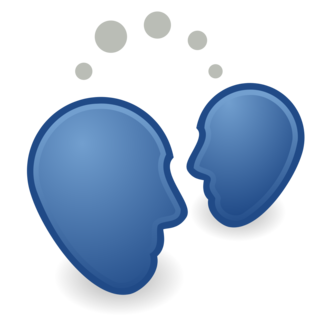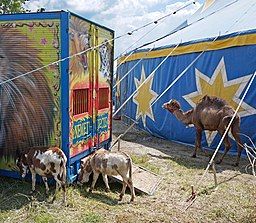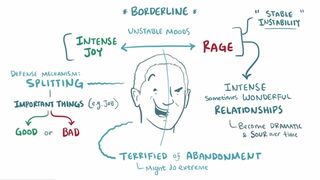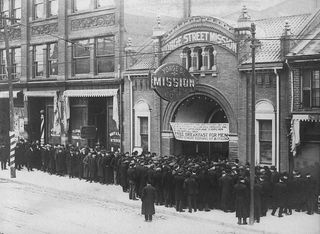How The Animals Are Treated In Water For Elephant
In The Science of Evil: On Empathy and the Origins of Cruelty, neuroscientist Simon Baron-Cohen identifies the essential component of evil as a lack of empathy. While empathy has been divers in various ways, Baron-Cohen's definition reveals its connectedness to both benevolence and morality: "Empathy is our ability to place what someone else is thinking or feeling and to reply to their thoughts and feelings with an appropriate emotion" (xvi).

Empathy: "My listen to your mind."
Source: GNOME Project/CC BY-SA/Wikimedia Eatables
The book begins with a description of atrocities perpetrated during the Holocaust and the Rwandan genocide, accounts that are non for the squeamish. The psychological enabler of horrific acts such equally he describes and, unfortunately, of endless others perpetrated by our species, is the absenteeism of empathy, or the power to turn off one's empathy. "Zero empathy" virtually often selectively targets people of a given race, gender, ethnicity, or socioeconomic status. Baron-Cohen aptly describes this phenomenon as "turning people into objects." Empathy isn't ever necessary for morality, but evil nearly always involves its absenteeism.
Baron-Cohen turns from examining the lack, or erosion of empathy at this yard calibration to looking at its effects in individuals, claiming that the Cluster B personality disorders are actually empathy disorders. Although in the current formulation of these disorders in the Diagnostic and Statistical Manual of Mental Disorders, Fifth Edition (DSM-v), lack of empathy appears in the diagnostic criteria only for Narcissistic Personality Disorder, an disability to grasp what others remember and experience characterizes most personality disorders. In the "Alternative DSM-5 Model for Personality Disorders," an experimental section that will almost certainly supervene upon the electric current category-bound definitions in the adjacent edition of the DSM, an important criterion for diagnosing personality disorders is impaired performance in 2 of 4 crucial categories. Empathy is one of these. (The others are identity, cocky-direction, and intimacy.)
Sarah Gruen might accept written her novel Water for Elephants to illustrate Baron-Cohen's theory of empathy and evil. To begin with, Gruen foregrounds empathy. Hither is a passage describing the primary grapheme, Jacob Jankowski'southward, feelings for the circus animals he cares for (as a veterinarian, more than of that momentarily):
"It'due south incommunicable to describe how tenderly I all of a sudden experience toward them—hyenas, camels, and all. Even the polar bear, who sits on his backside chewing his four-inch claws with his four-inch teeth. A love for these animals wells upwards in me suddenly, a flash flood and in that location information technology is, solid every bit an obelisk and viscous equally water."

Circus Animals
Source: Wikimedia Commons/Tiia Monto / CC BY-SA
Jacob loves the animals because he empathizes with them, grasping how they experience. And his empathy protects them from the lack of empathy of those who exploit them for money, whose treatment ranges from insouciant to abusive. Jacob knows, "In that location is no question that I am the only affair standing betwixt these animals and the concern practices of Baronial and Uncle Al ... I cannot get out these animals I am their shepherd, their protector."
The novel is narrated by Jacob, who tells of his adventures equally a young man of 23 (or possibly 20—he can't call back), and of his current life as an erstwhile man living in a nursing home, who is 93 (or perchance 90). The narrative alternates time periods, with the majority of episodes focusing on Jacob'due south youth, simply with periodic returns to the current mean solar day.
The story in the past begins when Jacob is just about to have his finals in his last year of veterinarian schoolhouse at Cornell. His parents are killed in a machine accident, and in add-on to suffering the trauma of this sudden tragedy, Jacob learns that he is apartment broke—his male parent (also a vet) had been treating animals for free for years considering people could non afford to pay. Jacob leaves Cornell with no idea of where to go and ends up joining a circus as the vet (they don't intendance if he didn't take his finals).
A vet, a circus—yeah, this novel is largely about animals, and, as you might likewise expect, an implicit plea for their humane treatment. Simply information technology is just as much about humans, and a plea for their humane treatment as well. In fact, the animals and humans have names that mix up categories. Rosie is the elephant (in the past) but Rosemary is the nurse who befriends the elderly Jacob (the present); Camel is the human Jacob nurses (in the by), although he is an fauna md, and of class, there is a existent camel in the circus; words that can apply to both human being and not-human animals are common ("Nurse!" I bark. Nurse!").
Animals are as well shown to have capabilities causeless by many to belong exclusively to humans, claims that have been confirmed by ethologists (another pertinent book is Frans de Waal's Are We Smart Enough to Know How Smart Animals Are?). Jacob, as thoroughly equally he knows animals, is astonished when he gives an orangutan an orange that she has pointed to and the ape and then takes his manus and "wraps her long fingers around it, and then lets go." Jacob realizes "in amazement" that she "was thanking me." (A real-life example of an incident of this kind involving a chimpanzee is told by Jane Goodall in In the Shadow of Human).
The most telling and terrible similarity between human being and not-human animals is that some of the members of the circus are treated like humans and others (mis)treated like animals. As the philosopher Syl Ko points out, much of our world is structured by viewing some people equally animals, a category that is –wrongly—assumed to be inferior, and which establishes a binary separate between humans and animals that justifies corruption. Both people and animals (including people who are equated with animals) are abused past those who lack empathy or who are capable of turning their empathy off—by those who plow living beings into objects.
Gruen, like Baron-Cohen, connects lack of empathy with the cluster B personality disorders. Any therapist who reads the novel volition easily diagnose August, the ringmaster, with deadline personality disorder, given his lightning-quick reactivity and instability of mood; his alternation of attitudes, particularly between idealization and devaluation of his wife, Marlena; his intense fear of abandonment, long earlier she decides to go out him; and his uncontrollable anger (Marlena lives in fear of Baronial for years and finally decides to exit when he becomes physically calumniating).
August is as well abusive to the circus's animals, specially Rosie the elephant. Even the hardened circus workers who are used to treating the animals harshly are appalled. The owner of the circus, Uncle Al, knows there is something wrong and tries to excuse August's unacceptable beliefs by reference to mental affliction, diagnosing him as a "paragon schnitzophonic."

Borderline Personality Disorder
Source: Wikimedia Commons/Osmosis/CC BY-SA
Uncle Al is mistaken in his diagnosis too as his language. Yet that is not the only irony. Uncle Al too suffers from a mental illness, conspicuously fulfilling the criteria for antisocial personality disorder. He certainly exhibits "a pervasive design for and violation of the rights of others," evidenced past his throwing men off a moving train (redlighting) as a fashion of firing them (he kills several workers this way); deceitfulness (he lies about many things to workers, performers, police); irresponsibility (he does not pay his workers for weeks on end); and irritability and aggressiveness (people know to stay out of his style when he is angry because he slaps them indiscriminately). These are all behaviors for which he has not a shred of remorse.
The theme of empathy pertains equally much to the present as the past. Gruen's novel speaks non simply confronting objectifying animals but besides against what might be an even more than invisible license for oppression, our lack of empathy with the elderly.
The novel's title Water for Elephants is a reference to a lie told past a new resident in the nursing home where Jacob has been forced to live by his children, an unfeeling lot; not ane of the five of them volition take him in even though he does not accept dementia and needs minimal assistance with cocky-care. The newcomer at the home boasts of having worked for a circus and brought water for elephants to drink, an impossibility since no one could comport a sufficient corporeality of h2o to satisfy an elephant. This boast makes Jacob, who really did piece of work for a circus and treat an elephant, feel invalidated. No ane has asked most his story, and he is not plenty of an "onetime fart" to boast of his past. He is not recognized for who he is, a class of affirmation needed by well-nigh of united states of america.
No one asks Jacob about himself because the elderly in the nursing abode are treated like objects, as are the animals in the circus. In fact, the elderly, with their wheelchairs and walkers, are pretty much herded from one activity to another. The food they are given (also an outcome for animals in the flashback portion of the novel) is banal and tasteless; no 1 cares what Jacob wants to eat, or that he still has the capability to ingest real food rather than pablum. No 1, that is, until Rosemary the nurse befriends him. Rosemary recognizes the person "inside" the elderly body, and she begins to treat Jacob with respect.
The link between cruelty to animals and psychopathology has been established in the academic psychological literature. Information technology is glaring in egregious forms of abuse such as torture; psychopaths lack respect for all living creatures. But the subtle means in which we plough our empathy off, seeing other living creatures as objects, are oftentimes less obvious. We don't remember virtually the package of chicken we buy for dinner—information technology is a package, not a craven. And the manufacturing plant farming industry wants to continue it that way. We also all too often fail to see the elderly people nosotros should respect as anything other than objects, estranged forms of life who not are like usa. Animals all.
Information technology is not accidental that Gruen sets the episodes in the past during the Bully Depression. The crash of 1929 demonstrated a failure of empathy at the sociopolitical level (where Baron-Cohen begins). The United States did non take care of its people when the going got tough. Where was the condom cyberspace that might have prevented the desperation and poverty that haunted our land? The Depression is omnipresent in Water for Elephants, from the grouping of homeless people Jacob encounters while running from a raid on a Speakeasy; to the men at the circus who will put up with unfair working weather condition considering they demand a job—any job; to Jacob himself, who is left penniless when his parents die considering his father helped others who had nowhere else to plough.

Depression-Era Soup Kitchen
Source: Wikimedia Eatables/Unknown Author
Roosevelt's New Deal, which gave us Social Security, was a response to the Low, a promise that we would at least be provided for in old historic period. President Johnson'due south Peachy Society continued the caretaking agenda, giving the states Medicare and Medicaid. Simply Gruen published her novel in 2006, when attempts to dismantle the social prophylactic net had been ongoing for decades under the aegis of politicians of both parties who came to power later on Johnson. H2o for Elephants impugns those who lack empathy for animals, for the elderly, and for other people in their individual relationships, the "micro" level, as social workers say. But it likewise indicts a social club that lacks empathy for those who demand some aid, where the gap between rich and poor, wide when Gruen wrote the novel, is even wider today.
A contempo New York Times headline proclaimed "Trump Family Legacy: Empathy Is for the Weak," with a secondary headline, "Nation's Crises Are Met With an Inability to Feel Others' Hurting." These headlines become at the heart of what is wrong with our current political leadership. But lack of empathy too describes what has been incorrect with many of our laws, institutions, and politics for many years. We have been steadily witnessing the triumph of neoliberalism, of order run according to the dictates of the marketplace, a mode that precludes empathetic responses to the unfortunate.
As 1 journalist explains this phenomenon: " [I]f you don't accept a job information technology's because yous are unenterprising. Never mind the impossible costs of housing: If your credit carte du jour is maxed out, you're feckless and improvident. Never heed that your children no longer have a schoolhouse playing field: if they get fat, information technology's your fault. In a earth governed by competition, those who fall backside become divers and self-divers as losers." And losers don't deserve our help. On the whole, nosotros are not a particularly empathetic society. Sara Gruen'due south narrative of the by speaks to our state of affairs in 1929, in 2006, and today.
I won't spoil the ending of H2o for Elephants for you because, despite its serious themes, it is a gloriously entertaining page-turner. I accept known people who never read for pleasance tell me they were unable to put the book down. Simply like the circus information technology depicts, this novel's glittering surface conceals the best and worst of which nosotros are capable as a species, both in the way nosotros relate to others of our kind and in the way nosotros relate to the creatures who share our planet.
Note: I thank the students in the writing seminar I taught for Cornell'south Prefreshman Summer Progam this twelvemonth (2020): Robyn Chung, Chris Cieciura, Sanaa Greene, Yay Helene Logan, Faith Taylor, and Ayleen Yanza. It was a pleasure to think through ideas and books with these brilliant and dedicated students.
Source: https://www.psychologytoday.com/us/blog/intersubjective/202008/water-elephants-and-the-spectacle-good-and-evil
Posted by: mckeelecladmands.blogspot.com

0 Response to "How The Animals Are Treated In Water For Elephant"
Post a Comment